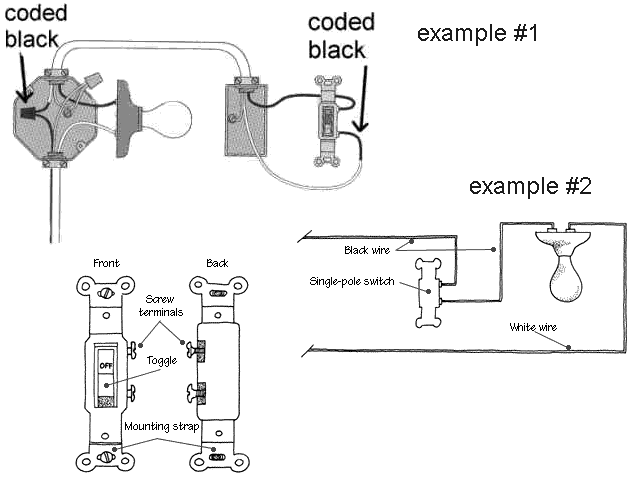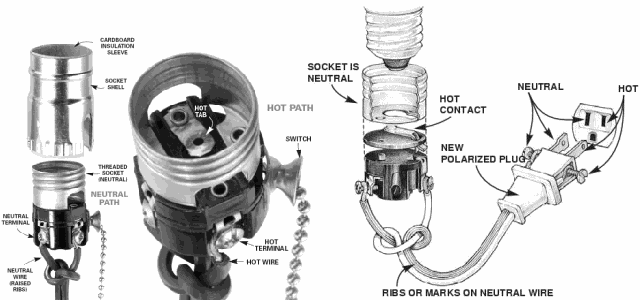Difference between revisions of "Wiring an Electrical Light Switch"
m |
|||
| (6 intermediate revisions by one user not shown) | |||
| Line 1: | Line 1: | ||
| − | Mount a light switch 48 inches from the floor. | + | Mount a light switch 48 (52 OC) inches from the floor. See also [[Rough In Wiring Height]]. |
== Standard 2-Way Switch == | == Standard 2-Way Switch == | ||
| Line 11: | Line 11: | ||
A three way circuit allows a person to control a light from two locations. This means that you have the ability to turn the light on or off from either of switch locations, regardless of the position of the other switch. However, unlike the standard 2-way switch where up is on and down is off, the positions of the switches on a 3-way switch is not always indicative of the of the light being on or off. | A three way circuit allows a person to control a light from two locations. This means that you have the ability to turn the light on or off from either of switch locations, regardless of the position of the other switch. However, unlike the standard 2-way switch where up is on and down is off, the positions of the switches on a 3-way switch is not always indicative of the of the light being on or off. | ||
| − | == | + | [[Image:threewayswitchdiagram.gif]] |
| + | |||
| + | | ||
| + | |||
| + | == Light Fixture == | ||
| + | The most basic light fixture has a brass terminal and a silver terminal at the top for connecting to electrical wires. To wire the fixture for safety and to electrical code, the hot wire should be connected to the brass terminal screw, and the neutral wire to the silver terminal screw. | ||
| + | |||
| + | * Brass Screw Terminal - Hot | ||
| + | * Silver Screw Terminal - Neutral | ||
| + | |||
| + | [[Image:basicfixturebrasssilver.gif]] | ||
| + | |||
| + | | ||
| + | |||
| + | == Lamp Cord Wiring == | ||
| + | |||
The threaded part of a light socket should NEVER be hot for safety reasons. The tab at the bottom of the socket is where the hot voltage is supplied, which is switched via the pull chain - or if using a switched light, by the switch. | The threaded part of a light socket should NEVER be hot for safety reasons. The tab at the bottom of the socket is where the hot voltage is supplied, which is switched via the pull chain - or if using a switched light, by the switch. | ||
| Line 18: | Line 33: | ||
[[Image:pullchainlamp16c.gif]] | [[Image:pullchainlamp16c.gif]] | ||
| − | + | | |
| + | |||
| + | == International Conventions == | ||
| + | |||
| + | === Brown and Blue wires on a fixture === | ||
| + | |||
| + | In Europe sometimes a light is wired with a brown and blue. | ||
| + | * EU: Blue = neutral (US: white) | ||
| + | * EU: Brown = hot/line (US: black) | ||
| + | * EU: Green/Yellow = ground (US: green or bare copper) | ||
| + | |||
| + | To wire a fixture in EU for US blue to white, black to brown and green to green/yellow. Keep in mind voltage differences. LED lights with an auto switching transformer are sometimes manufactured for AC 90 - 265V so are compatible with both US and EU voltage standards. | ||
| + | |||
| + | In Europe, the hot wire is known as the "line" wire, sometimes represented by the letter "L" on a fixture. | ||
| − | |||
| − | |||
| | ||
| Line 30: | Line 56: | ||
[[Category:Electrical]] | [[Category:Electrical]] | ||
[[Category:Construction]] | [[Category:Construction]] | ||
| + | [[Category:Lighting]] | ||
Latest revision as of 17:17, 2 August 2014
Mount a light switch 48 (52 OC) inches from the floor. See also Rough In Wiring Height.
Contents
Standard 2-Way Switch
The most familiar light switch, the common "light switch" is actually referred to by hardware dealers and electricians as a "single pole switch." A single pole switch has two brass terminal screws on the side.
3-Way Switch
A three way circuit allows a person to control a light from two locations. This means that you have the ability to turn the light on or off from either of switch locations, regardless of the position of the other switch. However, unlike the standard 2-way switch where up is on and down is off, the positions of the switches on a 3-way switch is not always indicative of the of the light being on or off.
Light Fixture
The most basic light fixture has a brass terminal and a silver terminal at the top for connecting to electrical wires. To wire the fixture for safety and to electrical code, the hot wire should be connected to the brass terminal screw, and the neutral wire to the silver terminal screw.
- Brass Screw Terminal - Hot
- Silver Screw Terminal - Neutral
Lamp Cord Wiring
The threaded part of a light socket should NEVER be hot for safety reasons. The tab at the bottom of the socket is where the hot voltage is supplied, which is switched via the pull chain - or if using a switched light, by the switch.
The neutral wire of a lamp cord is typically marked in some way and goes to the wider of the two plugs at the end.
International Conventions
Brown and Blue wires on a fixture
In Europe sometimes a light is wired with a brown and blue.
- EU: Blue = neutral (US: white)
- EU: Brown = hot/line (US: black)
- EU: Green/Yellow = ground (US: green or bare copper)
To wire a fixture in EU for US blue to white, black to brown and green to green/yellow. Keep in mind voltage differences. LED lights with an auto switching transformer are sometimes manufactured for AC 90 - 265V so are compatible with both US and EU voltage standards.
In Europe, the hot wire is known as the "line" wire, sometimes represented by the letter "L" on a fixture.



